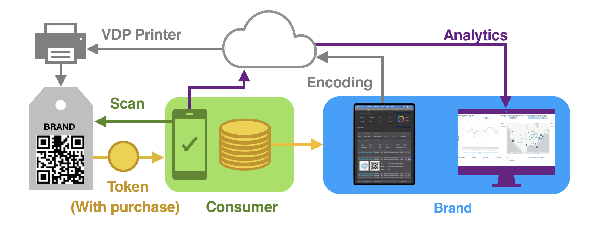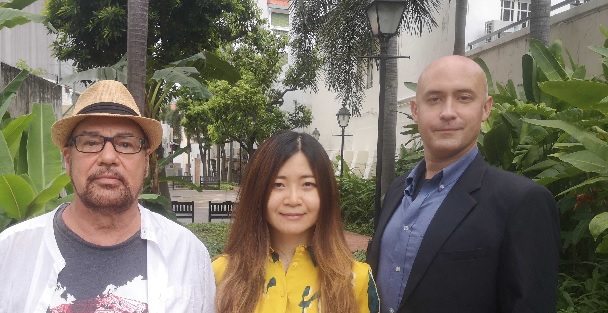SINGAPORE, January 29, 2021 – Startups in blockchain have gained investors attention since last few years and are lauded as the fifth evolution in digital transformation. The demand for managing the supply chain with trusted algorithms is surging as AI and automation play a pivotal role.
Dr.Peter Finn, CEO, Synectify had a vision to introduce a technology which would enable the trusted exchange of goods and information across otherwise untrusted supply chains. Just when he was ready to role out a plan to launch this technology the global pandemic eroded which pushed the launch plans to further dates. Finally, Peter took the plunge and few months back, Synectify was launched and is a registered start-up in Singapore.
Peter finished his PhD from National University of Singapore (NUS) and King’s College, London (KCL) is a polymath, technologist and a serial entrepreneur. An early blockchain enthusiast, he has been an advisor to projects large and small including a position on the RChain Asia Advisory Board (2018–19), in which capacity he was also an RChain genesis validator and node operator. His various fellowships, grants and awards are highlighted by a recognition for heroism from the Singapore Civil Defence Force (2014), and an NUS deep tech development grant for technology commercialisation in the year 2019. He has contributed to open source software projects like Plan 9 from Bell Labs and the Inferno operating systems.
Synectify a promising start-up is supported by NUS Graduate Research Innovation Programme (NUS GRIP) is currently boot strapped and looking at raising funds. NUS GRIP was launched in 2018 and is the Industry Liaison Office’s flagship innovation programme. Under this program companies are provided step-by-step guidance to NUS Postgraduate students and researchers to cultivate deep tech entrepreneurs to transform the university’s world-class research into their own deep technology start-ups. NUS plans to invest up to $100,000 in start-ups demonstrating high commercial potential to accelerate their growth. They are committed to take in 50 teams a year, generating a pipeline of up to 250 teams in five years. What’s unique about NUS GRIP is that it brings together the most brilliant minds to solve industry problems with top research innovations, in commercially viable and financially sustainable ways.
Innovating at the intersection of IoT and blockchain the newly launched technology RootChain by Synectify tackles counterfeiting thus building a robust and reliable supply chain. The prime focus of this technology is on essentials for COVID-19 like personal protective equipment (PPE), face masks to begin with. The Founders of the company feels that the platform has added benefit of collecting data of epidemiological, research, policy, and marketing significance concerning the use of face masks. The company is also looking at expanding the products and offerings in the consumer product protection and supply chain space as the business unfolds.
In an exclusive interview with AsiaBizToday, Dr.Peter Finn, CEO shares some nuggets about the journey of this newly launched company and on how the technology will make a difference.
Can you brief our readers about what Synectify does?
Synectify builds software that enables the trusted exchange of goods and information across otherwise untrusted supply chains. Our launch product, RootChain, leverages a robust, low-cost, two-factor authentication approach to track, trace, and testify the authenticity to fast-moving consumer goods. The pandemic has shown that our solution is particularly well-suited to products like face masks in which there is a high degree of supply chain compromise leading to counterfeit or non-conforming goods.

Synectify was launched during the pandemic hit world, what were the challenges that you as a company faced during the launch?
The pandemic restricted our movements, our ability to meet with clients, and thus our ability to provide advice about integrating with their existing manufacturing process. Much of this had to be done remotely using twin systems installed at our facilities. The distributed nature of our development team, with some in Singapore and some in the United States stretched communication at times. The advantage to forming a new company amid a pandemic and recession is that it is easy to control one’s costs, a distributed development team also meant that development could often proceed around the clock on different sides of the globe. It’s important to always be on the lookout for what one’s apparently undesirable circumstances enable you to do.
Where did the capital for starting the business come from? Where is it deployed? What is the company’s 5-year plan?
The capital for starting the business was supplied by the Founders. It was deployed primarily to cover the development of RootChain our launch product. Most of the funds went to personnel and hardware. We were fortunate to receive support from AWS Activate which provided advice on building our cloud infrastructure and credits to help get it up and running.
In five years, Synectify intends to see its anti-counterfeiting approach adopted as an international standard. To reach that goal we will continue to make improvements to our core product develop supporting products and expand our market share. Looking ahead, we intend to further extend RootChain to remotely authenticate IoT devices, servers, and embedded systems, as we see this as the next horizon of counterfeiting prevention.
Do you plan to raise funds in future?
Yes, we are currently actively engaged in fund raising to expand our sales and marketing force, grow our customer base, and advance our product’s development.
The tech firm is backed by NUS, how does the synergy work?
Synectify provides a vehicle for the commercialisation of NUS technology. NUS provided Synectify with facilities, resources, support and access to its network of investors and advisors. It’s been fantastic journey together so far.
Who are the customers that you have got on board?
Our current customers are surgical face mask manufacturers. We are working on deploying a pilot with American Surgical Mask in the United States (https://americansurgicalmask.com/) and are in discussions to grow our customer base among local mask manufacturers as well as manufacturers of CV19 test kits and vaccines.
Is the firm bootstrapped? Are there any expansion plans on the cards ?
The enterprise is currently bootstrapping. To accelerate, however, we hope to attract investment from a partner who can help take our product to the next level.
Any message that you would like to give to upcoming startups?
Be fearless, stay focused, keep going — and always look for the opportunity in adversity.
The team at Synectify are busy talking to funders and potential clients and assume markets will pick up at the news of Cov-19 vaccines availability by early next year. Essentials market is here to stay for a decade or so and will see a boom in production thus making it challenging for the World to get hold of certified and original products. One of the first client on board American Surgical Mask from the United States, Co-founder and CSO, Kahoru Watanabe quips, “As we seek to secure the next generation of FDA surgical mask approvals, we see blockchain integration as a competitive advantage for us and to the end user of our masks. Synectify could provide a solution tailored to our requirements”.
We are likely to witness the logistics industry embracing blockchain and its applications among other processes. The technology needs to be merged with the trends and demands thus creating a seamless experience in a secure and compliant manner.


